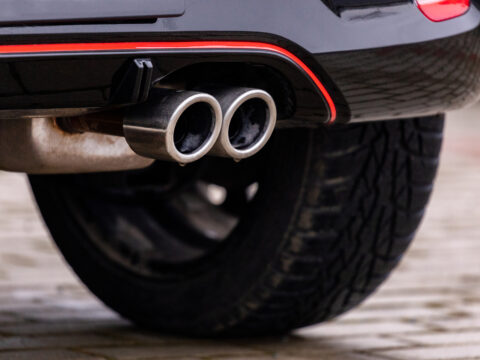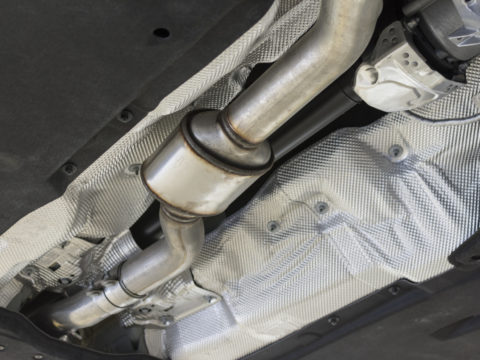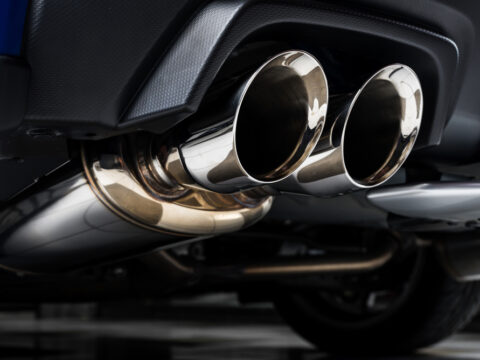White smoke coming out of your exhaust pipe can be worrying. Reasons could range from something as harmless as condensation to something as serious as engine damage. It is generally never a good sign that your car is producing smoke. However, there are some circumstances in which this is normal. Learn when this may be normal, and find out what to do when it’s an issue.
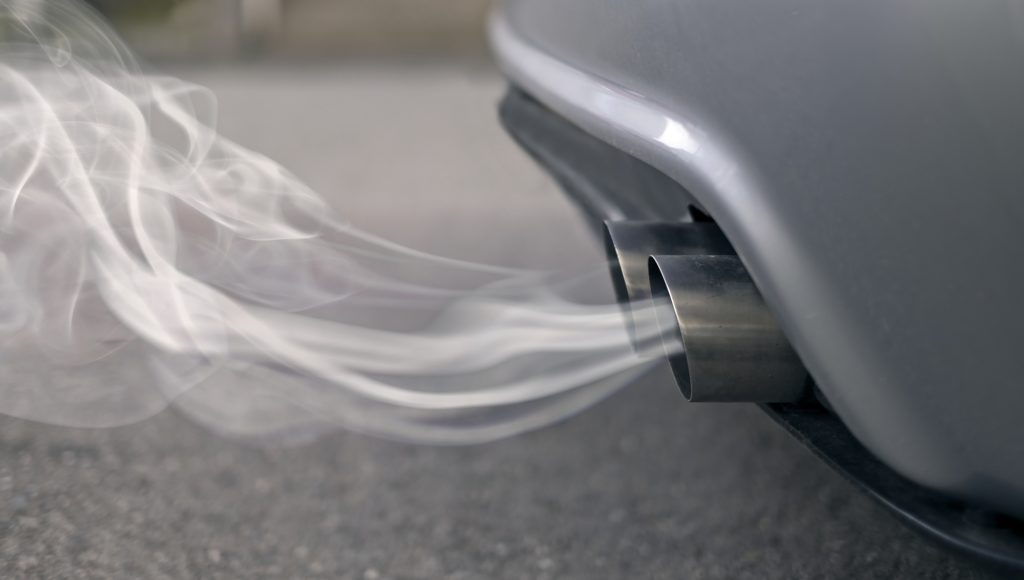
In a Gasoline Engine
There are various reasons why white smoke could be coming from vehicles with a gasoline engine. Common causes of white smoke emission are improperly burning fuel, coolant leaking, or low combustion chamber temperatures. Water collects in the exhaust system and produces steam.
In a Diesel Engine
In a diesel vehicle, thicker smoke indicates that fuel is not burning correctly. It could also be that coolant is leaking, or the temperature in the combustion chamber is too low.
An issue unique to diesel engines involves the injection pump. An injection pump pumps fuel into the diesel engine. If the pump’s timing is off, the vehicle’s fuel will not completely burn. There could also be water mixing with the diesel, likely caused by a crack in the head gasket.
Contents
What Should I Do If I See White Smoke Coming From My Exhaust?
Nobody reacts well to any sort of smoke coming from their vehicle’s exhaust system. Here’s a look at when white smoke is regular and when you might have a reason for concern.
When a White Smoke in the Exhaust is Normal
White smoke may not always be a cause for concern. In cold or damp weather, condensation can collect inside the exhaust pipes and other vehicle parts, such as the muffler. It may cause thin, white smoke to come out of the exhaust pipe when this happens.
Once the temperature of the engine is regulated, the smoke should disappear. This occurrence is standard after a long period of inactivity. However, if smoking continues after the engine is warmed up, it could signify another issue with your vehicle.
When a White Smoke in the Exhaust Could Be a Problem
If the white smoke coming out of your exhaust is thick, it may indicate a problem. One of the most common causes is a coolant leak. Coolant regulates the temperature of an engine. A coolant leak may be the result of a cracked head gasket, a blown radiator hose, or radiator corrosion.
When coolant leaks, a thick, white smoke emits from the exhaust. Smoke caused by a coolant leak is often sweet-smelling. You should address even the most minor leaks because, if left untreated, they can cause engine damage.
If white smoke appears during accelerating, it can be due to coolant or transmission fluid leaks. If the exhaust smells of burned oil, the smoke may result from transmission fluid leaking and burning.
5 Common Causes of White Smoke During Startup
- One common cause of white smoke during startup is temperature regulation. The engine and exhaust must reach the proper temperature to operate correctly.
- Another common cause, as previously mentioned, is condensation. You’ll typically see this happen during colder months when hot air or gas from the exhaust meets cold air.
- A more worrisome reason for white smoke upon startup is a coolant leak. These leaks can result in an overheated and damaged engine.
- Another cause of white smoke on startup is piston ring damage. Piston rings regulate oil consumption. A leak in the combustion chamber can cause burning and result in smoke in the exhaust.
- A fuel injector delivers the fuel to the engine. If your fuel injector is damaged, it will deliver either too much or too little fuel, leading to improper burning and exhaust smoke.
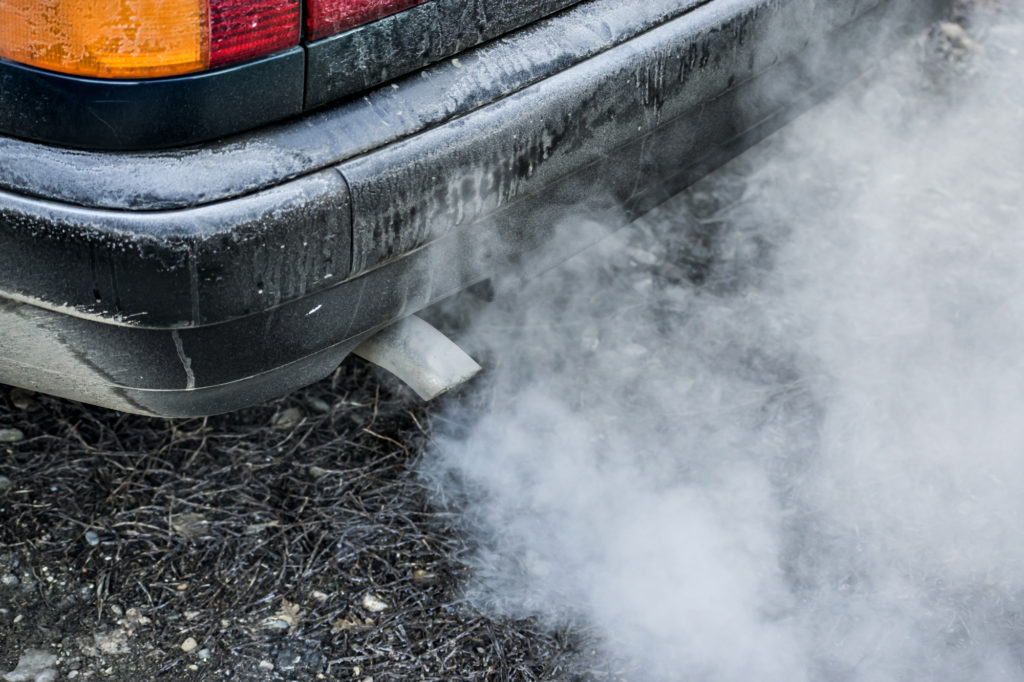
How to Fix White Smoke From Exhaust
There are various ways to try to determine the source of the smoke coming from your exhaust. If you suspect that coolant levels are causing the issue, you can check the coolant levels; if they’re too low, you can obtain the correct fluid and fill the reservoir to the appropriate level. If coolant levels aren’t low, the issue may lie in a coolant leak. Check for cracks or damage in parts of the engine.
If you have the appropriate tools, a cooling system pressure test may be helpful. This test checks for leaks by applying pressure and simulating a hot engine. If the system cannot hold pressure, there is likely a leak.
A damaged head gasket could be the source of a coolant leak. It is possible to change your head gasket on your own. You can watch instructional videos online, but it is crucial to contact a professional if you are uncomfortable or unsure of what you are doing. If your head gasket isn’t the source of the leak, you should check the cylinder head.
If there are cracks in the cylinder head, you will have to replace it. Replacing the cylinder head will cost at least $500, depending on the vehicle. If it is an older or more expensive vehicle, the cylinder head may be iron and more costly to replace.
If you believe that transmission fluid is the issue, you should first check the fluid level. If the fluid is too low, it may be causing the problem. If the correct amount of fluid is present, this may mean that your transmission vacuum modulator valve may need to be changed. If the exhaust smells like gas, you may need to replace the fuel.
Once you’ve identified the source of the white smoke, you should contact a trusted professional if you need assistance.
FAQs
If you have more questions about white exhaust smoke, here are some of the most commonly asked questions.
Does white smoke always mean a blown head gasket?
White smoke does not always mean a blown head gasket. White smoke could be anything as harmless as condensation to something as serious as an engine coolant. It is essential to determine the cause of the smoke and contact a professional if necessary.
Why is there blue smoke coming out of my exhaust?
Blue smoke coming out of your exhaust likely indicates an oil leak. Issues such as damaged piston rings, cylinder heads, or valve seals can cause these types of leaks. It could also mean that there is too much oil and that you need to get it drained.
What does grey smoke during startup mean?
Grey smoke during startup could be due to several causes. There could be excess oil that needs draining or a transmission fluid leak. Another possibility is a PCV valve failure.
What causes white smoke when it’s idle?
In this case, white smoke could be condensation, which will go away once the engine temperature is regulated. However, it may be an indication of issues with the combustion chambers. Oil may have leaked inside and burned.
Why does my exhaust have white smoke when it’s cold?
White smoke emitting from the exhaust when it is cold outside is normal and usually not a cause for concern. Engines need to be at a specific temperature to operate correctly. When it is cold or damp outside, steam will come out of the exhaust pipes until the temperature is regulated. If this continues, there may be another issue.
Why is my car blowing white smoke but not overheating?
If your car is blowing white smoke but not overheating, it could be due to condensation or a coolant leak. White smoke due to a coolant leak can be identified by its thicker appearance and sweet smell. The coolant has escaped and is burning with fuel in the combustion process.
What does it mean when my car blows white smoke then losing power?
If your car is blowing out white smoke and then losing power, it likely indicates overheating. You should check for a coolant leak, as, if left unchecked, it could lead to further engine damage.

